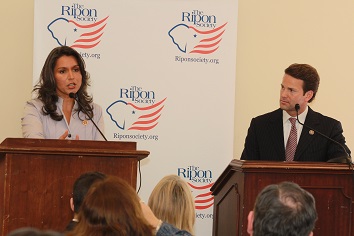Schock & Gabbard discuss the Congressional Future Caucus and why working across the aisle is critical to getting something done
 WASHINGTON, D.C. – At a time when Congress is mired in gridlock and seems to be debating the same issues over and over again, The Ripon Society held a bipartisan luncheon discussion with two Members of the House who are trying to reverse that trend. The Members are Rep. Aaron Schock (IL-18) and Rep. Tulsi Gabbard (HI-2).
WASHINGTON, D.C. – At a time when Congress is mired in gridlock and seems to be debating the same issues over and over again, The Ripon Society held a bipartisan luncheon discussion with two Members of the House who are trying to reverse that trend. The Members are Rep. Aaron Schock (IL-18) and Rep. Tulsi Gabbard (HI-2).
Schock, a third-term Republican who was born in 1981, and Gabbard, a first-term Democrat who was born that same year, are the founders and co-chairs of the Congressional Future Caucus. Formed last September, the mission of the Caucus is to develop long-term solutions for issues facing America’s next generation, and foster a bipartisan community of Members who are dedicated to pragmatic, innovative leadership on future-oriented issues facing America. The two appeared before The Ripon Society this past Thursday to discuss this mission and explain why they believe the Caucus is needed.
“I’m in my third term in Congress, running for my fourth,” Schock stated. “Prior to that, I served in the state legislature, and prior to that, on the school board. What I learned very quickly is that anyone who creates themselves an island is not effective. And the only way you can get anything done — in local government or the state legislature and certainly at the federal level — is by working as a team. So when I came to Congress five years ago, I was one of the odd ducks admitted to all four of the new member orientations — because in my view, it was important to get to know all of the members of Congress. And so I went to all four of the weekends to get to know the members, their spouses, what makes them tick, what their background was, because you have to know how to work with these members of Congress. Little did I know, two years later, about 40 of those 60 freshmen would be gone. I learned very quickly that the power structure may change…
“The point is, in the last decade we’ve seen both parties control the entire process. I’m a Republican through and through. Tulsi and I will have our differences on policy from time to time. The Republicans had the House, Senate, and the Presidency. The Democrats had the House, Senate, and the Presidency. Many of these same issues that we continue to talk about — whether it be entitlement reforms that need to happen if we’re going to truly change the long-term trajectory on our debt or immigration reform which is undoubtedly hurting business and families that are affected by it — there’s never going to be a perfect situation, regardless of which particular party controls the process.
“The only way these problems are going to be solved is if we solve problems across the aisle. At its heart, the Future Caucus is about establishing those relationships with members who are willing to talk among themselves, who see the future similarly and share a frustration with the status quo, and who say: ‘You know, let’s work on some longer terms solutions. Let’s get a decent number of Members behind a consensus position, and then let’s rally support and collectively vote on them before the Congress.’”
Gabbard agreed with Schock’s assessment, and shared her own hopes for the Caucus, as well.
“We envision the Future Caucus as more than a bipartisan group. From a generational perspective, what we bring to the table is that we are driven by results. We understand that we have different principles. We have perhaps different values or guidelines that we follow as we approach the major challenges we see in our country. But we understand that we have a diverse country with a diverse set of viewpoints that is reflected here in Congress. And the only way that we can get results is to have an honest and candid conversation that is based sincerely on respect for each other and knowing that we have something to gain from each other.
“What we would like to do is not figure out how we fix the pothole of the day or put a Band-Aid on the issue that’s getting the headlines of the day, but look at these issues and ask, ‘How will they affect the next generation?’ One thing I’ve noticed since I’ve been here is that many of the policies we’re working on, whether it’s reauthorization or other things, are pieces of legislation that originated in the 1940s, 1950s, and 1960s — a time when we had leaders who were setting a vision for a generation. And we’re still working on that. But things have changed. We’ve got a 21st century economy with a lot of opportunity and innovation that’s occurring – much of it in the private sector. We in government need to not only catch up, but take a leadership role on setting the agenda for the next generation that will come after us.”
When asked following their remarks whether the Future Caucus was going to be focused more on policy or process, both Schock and Gabbard made clear that they will be focused on issues – issues that are not only important to the next generation of Americans, but ones around which they can build a consensus and win political support.
“The areas we are working on right now are the areas where we can get 30 to 40 members behind a proposal,” Schock said. “Obviously, our first proposal is not going to be to fix Medicare. Technology, for example, is one area where our government lags behind. The companies that are in the technology industry in our country tend to look more like Tulsi and me. And they don’t know who to talk to on Capitol Hill. They don’t have those relationships, and many of them are beginning to set up their federal affairs offices. I would argue that who better to champion their issues than the Members of Congress — the 40 of us — under the age of 40.”
“That’s active outreach we’re doing as well,” Gabbard added. “We’ve already started to reach out and go to the innovation hubs where all of these exciting things are happening, to see what we can learn from them and the real challenges and roadblocks that they hit.” Gabbard went on to discuss one other quality members of the Future Caucus share – pragmatism. It is a quality, she noted, that was in short supply last fall, but one that Caucus members hope to supply more of moving forward today.
“What we found during the government shutdown and in all of the things that have transpired since is that there is a lot of power that has not been tapped in the pragmatic middle ground. I think that people sometimes mischaracterize them as so-called moderates from each party. But what we saw during the shutdown — when everyone was forced to be here, and many of us took the opportunity to spend time and have dinner and actually talk very candidly and honestly together — is that this is unacceptable, and we need to do something about it.
“The positive that came from that horrible experience for everybody was people getting to know each other. You have people on the far ends of the ideological spectrum but very pragmatic saying, ‘We’ve got to be practical in our approach to these issues and figure out how we forge a way forward.’
To view Gabbard’s and Schock’s complete remarks before The Ripon Society’s luncheon discussion this past Thursday, please click on the link below:
______________________________
The Ripon Society is a public policy organization that was founded in 1962 and takes its name from the town where the Republican Party was born in 1854 – Ripon, Wisconsin. One of the main goals of The Ripon Society is to promote the ideas and principles that have made America great and contributed to the GOP’s success. These ideas include keeping our nation secure, keeping taxes low and having a federal government that is smaller, smarter and more accountable to the people.



